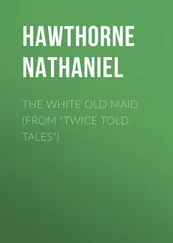The hall was fitted up with an amphitheatrical descent of seats towards a platform, on which stood a desk, two lights, a stool, and a capacious antique chair. The audience was of a generally decent and respectable character: old farmers, in their Sunday black coats, with shrewd, hard, sun-dried faces, and a cynical humor, oftener than any other expression, in their eyes; pretty girls, in many-colored attire; pretty young men, — the schoolmaster, the lawyer, or student at law, the shopkeeper, — all looking rather suburban than rural. In these days, there is absolutely no rusticity, except when the actual labor of the soil leaves its earth-mould on the person. There was likewise a considerable proportion of young and middle-aged women, many of them stern in feature, with marked foreheads, and a very definite line of eyebrow; a type of womanhood in which a bold intellectual development seems to be keeping pace with the progressive delicacy of the physical constitution. Of all these people I took note, at first, according to my custom. But I ceased to do so the moment that my eyes fell on an individual who sat two or three seats below me, immovable, apparently deep in thought, with his back, of course, towards me, and his face turned steadfastly upon the platform.
After sitting awhile in contemplation of this person’s familiar contour, I was irresistibly moved to step over the intervening benches, lay my hand on his shoulder, put my mouth close to his ear, and address him in a sepulchral, melodramatic whisper: “Hollingsworth! where have you left Zenobia?”
His nerves, however, were proof against my attack. He turned half around, and looked me in the face with great sad eyes, in which there was neither kindness nor resentment, nor any perceptible surprise.
“Zenobia, when I last saw her,” he answered, “was at Blithedale.”
He said no more. But there was a great deal of talk going on near me, among a knot of people who might be considered as representing the mysticism, or rather the mystic sensuality, of this singular age. The nature of the exhibition that was about to take place had probably given the turn to their conversation.
I heard, from a pale man in blue spectacles, some stranger stories than ever were written in a romance; told, too, with a simple, unimaginative steadfastness, which was terribly efficacious in compelling the auditor to receive them into the category of established facts. He cited instances of the miraculous power of one human being over the will and passions of another; insomuch that settled grief was but a shadow beneath the influence of a man possessing this potency, and the strong love of years melted away like a vapor. At the bidding of one of these wizards, the maiden, with her lover’s kiss still burning on her lips, would turn from him with icy indifference; the newly made widow would dig up her buried heart out of her young husband’s grave before the sods had taken root upon it; a mother with her babe’s milk in her bosom would thrust away her child. Human character was but soft wax in his hands; and guilt, or virtue, only the forms into which he should see fit to mould it. The religious sentiment was a flame which he could blow up with his breath, or a spark that he could utterly extinguish. It is unutterable, the horror and disgust with which I listened, and saw that, if these things were to be believed, the individual soul was virtually annihilated, and all that is sweet and pure in our present life debased, and that the idea of man’s eternal responsibility was made ridiculous, and immortality rendered at once impossible, and not worth acceptance. But I would have perished on the spot sooner than believe it.
The epoch of rapping spirits, and all the wonders that have followed in their train, — such as tables upset by invisible agencies, bells self-tolled at funerals, and ghostly music performed on jew’s-harps, — had not yet arrived. Alas, my countrymen, methinks we have fallen on an evil age! If these phenomena have not humbug at the bottom, so much the worse for us. What can they indicate, in a spiritual way, except that the soul of man is descending to a lower point than it has ever before reached while incarnate? We are pursuing a downward course in the eternal march, and thus bring ourselves into the same range with beings whom death, in requital of their gross and evil lives, has degraded below humanity! To hold intercourse with spirits of this order, we must stoop and grovel in some element more vile than earthly dust. These goblins, if they exist at all, are but the shadows of past mortality, outcasts, mere refuse stuff, adjudged unworthy of the eternal world, and, on the most favorable supposition, dwindling gradually into nothingness. The less we have to say to them the better, lest we share their fate!
The audience now began to be impatient; they signified their desire for the entertainment to commence by thump of sticks and stamp of boot-heels. Nor was it a great while longer before, in response to their call, there appeared a bearded personage in Oriental robes, looking like one of the enchanters of the Arabian Nights. He came upon the platform from a side door, saluted the spectators, not with a salaam, but a bow, took his station at the desk, and first blowing his nose with a white handkerchief, prepared to speak. The environment of the homely village hall, and the absence of many ingenious contrivances of stage effect with which the exhibition had heretofore been set off, seemed to bring the artifice of this character more openly upon the surface. No sooner did I behold the bearded enchanter, than, laying my hand again on Hollingsworth’s shoulder, I whispered in his ear, “Do you know him?”
“I never saw the man before,” he muttered, without turning his head.
But I had seen him three times already.
Once, on occasion of my first visit to the Veiled Lady; a second time, in the woodpath at Blithedale; and lastly, in Zenobia’s drawing-room. It was Westervelt. A quick association of ideas made me shudder from head to foot; and again, like an evil spirit, bringing up reminiscences of a man’s sins, I whispered a question in Hollingsworth’s ear, — ”What have you done with Priscilla?”
He gave a convulsive start, as if I had thrust a knife into him, writhed himself round on his seat, glared fiercely into my eyes, but answered not a word.
The Professor began his discourse, explanatory of the psychological phenomena, as he termed them, which it was his purpose to exhibit to the spectators. There remains no very distinct impression of it on my memory. It was eloquent, ingenious, plausible, with a delusive show of spirituality, yet really imbued throughout with a cold and dead materialism. I shivered, as at a current of chill air issuing out of a sepulchral vault, and bringing the smell of corruption along with it. He spoke of a new era that was dawning upon the world; an era that would link soul to soul, and the present life to what we call futurity, with a closeness that should finally convert both worlds into one great, mutually conscious brotherhood. He described (in a strange, philosophical guise, with terms of art, as if it were a matter of chemical discovery) the agency by which this mighty result was to be effected; nor would it have surprised me, had he pretended to hold up a portion of his universally pervasive fluid, as he affirmed it to be, in a glass phial.
At the close of his exordium, the Professor beckoned with his hand, — once, twice, thrice, — and a figure came gliding upon the platform, enveloped in a long veil of silvery whiteness. It fell about her like the texture of a summer cloud, with a kind of vagueness, so that the outline of the form beneath it could not be accurately discerned. But the movement of the Veiled Lady was graceful, free, and unembarrassed, like that of a person accustomed to be the spectacle of thousands; or, possibly, a blindfold prisoner within the sphere with which this dark earthly magician had surrounded her, she was wholly unconscious of being the central object to all those straining eyes.
Читать дальше












